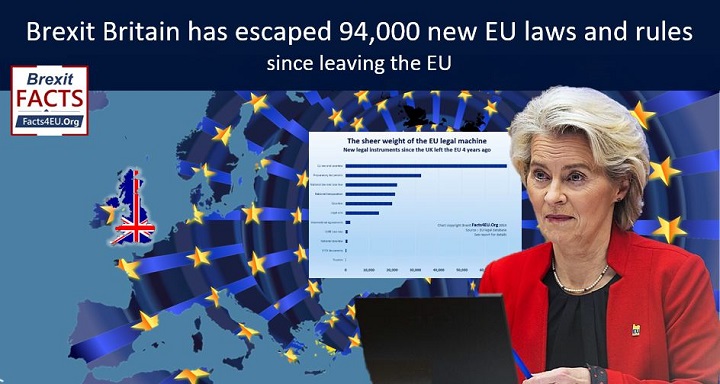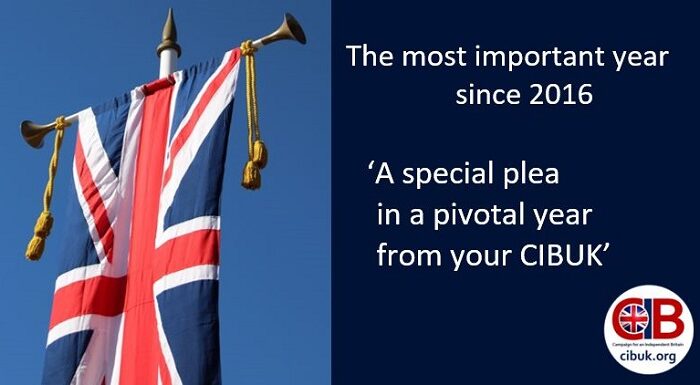‘Strangulated by red tape – why on earth would Britain wish to rejoin the EU?’

How short people’s memories are. There were many reasons people had for wanting to leave the European Union in 2016. One was the ability make and unmake our own laws and not have them foisted on us without our consent.
Did you know that in the four years since leaving the European Union, Brexit Britain has escaped 94,000 new EU laws and rules?
To all those who say we should rejoin, or even move towards ‘closer alignment’ with the European Union, we urge people to read the following report to understand its implications.
Top-down bureaucracy is the death-knell in any organisation yet it appears to be the very principle by which the European Union operates.
When one looks at the sheer volume of case-law now churning out of the EU’s legal factory, one can only wonder that anything gets done at all.
Why anyone would want closer alignment beggars belief. We are grateful as ever to our research affiliate, Brexit Facts4EU.Org for bringing this to our attention. What follows is a summary of the main findings and a link to the full article beneath it.
Brexit Britain has escaped 94,000 new EU laws and rules since leaving the EU
Facts4EU reveals the magnitude of the EU’s legal machine controlling people’s lives
In the four years since we left, the EU’s legal factory has been in overdrive
For Rejoiners who ask, “What has Brexit ever done for you?” we provide yet another example of a major benefit of the United Kingdom’s exit from the European Union.
Scarcely any aspect of people’s and businesses’ lives has been untouched by the EU’s obsession with determining what they can or cannot do. Now at least Great Britain (excluding Northern Ireland) no longer has to kowtow to all the autocrats in Brussels, Strasbourg and Luxembourg.
The exception is the European Court of Human Rights, to which the UK as a whole remains subservient. (See ‘Observations’ below.)
SUMMARY
Since leaving the EU on 31 Jan 2020, here is what Great Britain has escaped
In the last four years the EU’s legal machine has produced the following :-
- EU law and case-law (69,294)
- Legal acts (14,346)
- Treaties (2)
- International agreements (1,997)
- Preparatory documents (32,505)
- Case-law (20,030)
- EFTA documents (414)
- National law and case-law (22,066)
- National transposition (21,260)
- National case-law (806)
- JURE case-law (863)
- Grand total : 93,997
(This is the number of documents in the database encompassing all of the above.)
[Source : The EU’s legal database, accessed 04 Feb 2024.]
© Brexit Facts4EU.Org 2024 – click to enlarge
Former Brexit Minister The Rt Hon David Jones MP

“The European Union is a giant regulatory factory, as this excellent report graphically illustrates.
“Our British Common Law tradition is very different from the EU’s. Put simply, our legal system allows us to do anything that is not expressly forbidden; the EU, by contrast, seeks to micromanage every facet of personal and commercial life.
“We must, however, do much more to advance the Brexit revolution. We have assimilated thousands of pre-departure European Union laws through the Retained EU Law Act. The Government must rapidly review the utility of those laws and, where they are not of positive benefit, they should be swept away.
“Brexit should be a continuous, liberating process, and the Government must do much more to advance it.”
– David Jones MP, commenting to Facts4EU.Org and CIBUK.Org, 05 Feb 2024
Please support our work – we can’t carry on without your help:
Here is just one example
In order to give readers some idea of what Great Britain has dodged, we present an example chosen at random.
Just one random example
Title : “Regulation (EU) 2023/2411 of the European Parliament and of the Council of 18 October 2023 on the protection of geographical indications for craft and industrial products and amending Regulations (EU) 2017/1001 and (EU) 2019/1753”
Summary : “This Regulation lays down rules on:
(a) registration and protection of, and controls in relation to, geographical indications designating craft and industrial products with a given quality, reputation or other characteristic linked to their geographical origin; and
(b) geographical indications entered in the international register established under the Geneva Act of the Lisbon Agreement on Appellations of Origin and Geographical Indications (‘the Geneva Act’) administered by the World Intellectual Property Organization (WIPO).”
No. of pages : 56
This is only one new Regulation out of thousands avoided by Great Britain since our exit from the European Union four years ago.
We are grateful to our research affiliate BrexitFacts4EU.Org for their kind permission to re-publish this article, a copy of which can be read in full here.
Main image: Montage © Facts4EU.Org 2024






